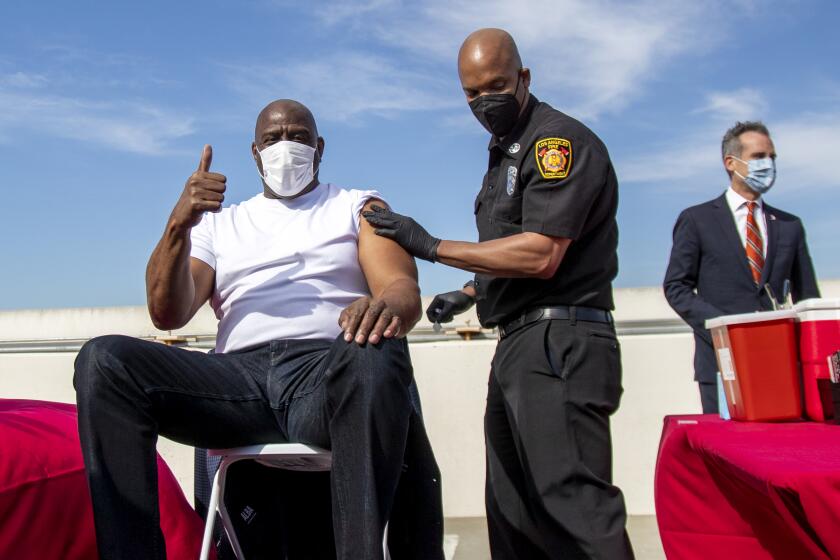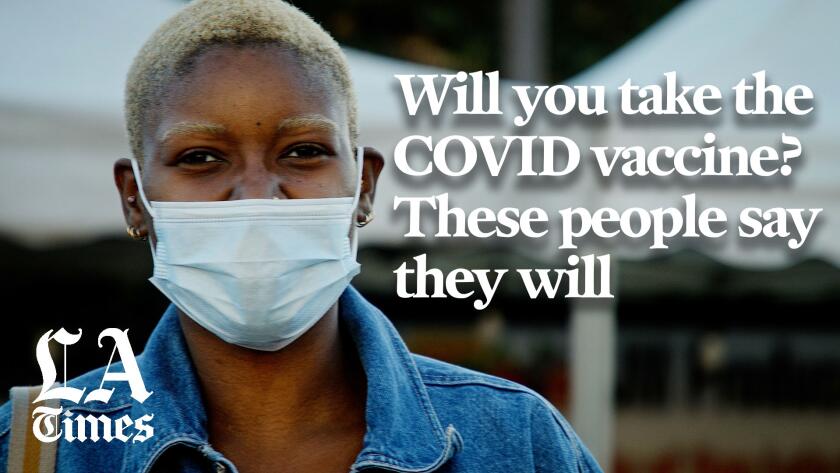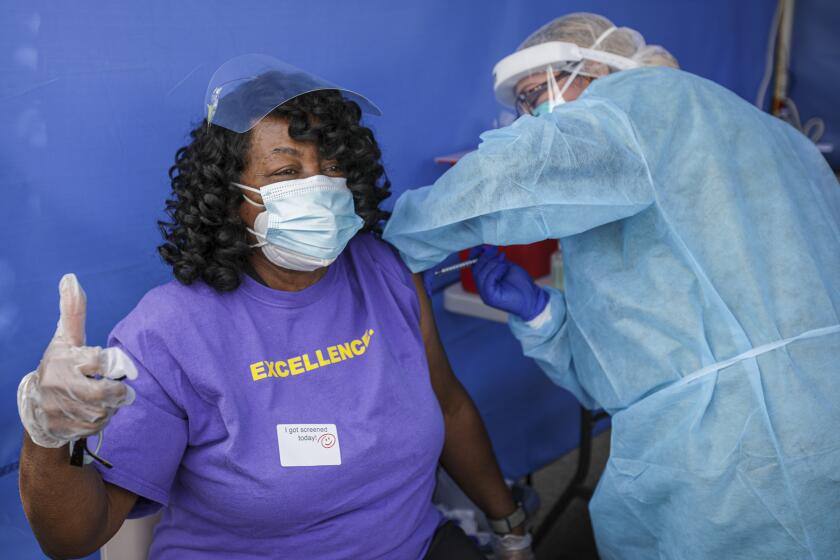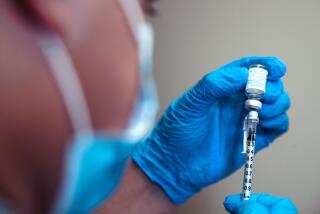Is needle fear holding you back from getting vaccinated? Here’s what to do about it
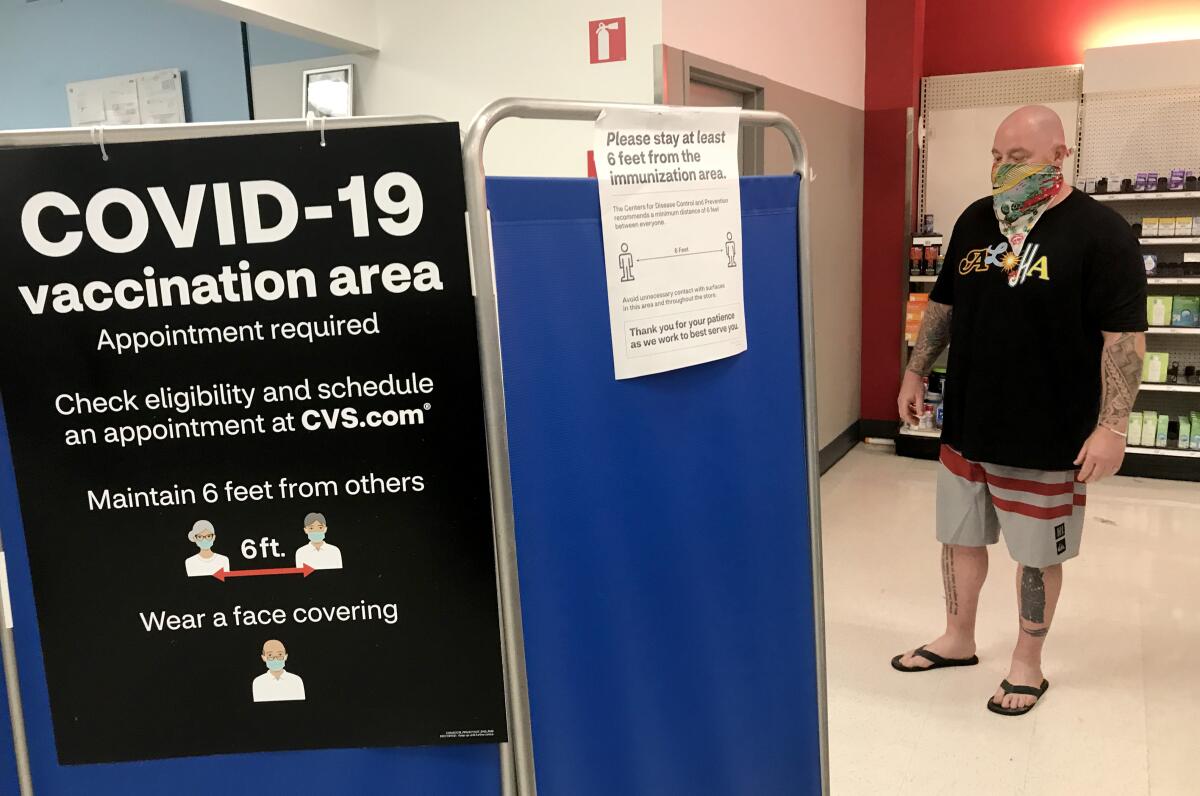
- Share via
Danielle Marie sat with a book in her hands and rock music blaring in her headphones. She answered “yes, yes, yes” to the nurse’s questions, barely hearing them.
Then, a swab of alcohol, a quick prick, a bandage applied, and Marie high-tailed it out of the room. She had survived her COVID-19 vaccination without a meltdown.
“I felt,” she said, “like I was super brave.”
Marie, 38, of North Hollywood, is afraid of needles, and she’s not the only one. One in four adults — some 76 million Americans — likely feel some fear, surveys show.
Most deep-seated fear of needles comes from childhood, after a negative experience. For Marie, it was barrages of allergy shots as a kid that she found painful and scary. In some cases, autism or other developmental disabilities can make the experience of getting a vaccine distressing.
Vaccine hesitancy has come to the fore amid a worldwide push for herd immunity against the coronavirus, but it was a major problem even before the pandemic. The World Health Organization in 2019 ranked vaccine hesitancy as a top-10 global health threat.
We may avoid vaccines for many reasons, but a fundamental cause shouldn’t be overlooked: Many people just don’t like getting shots. And some would rather die than get a routine vaccination.
For Marie, it did take a life-or-death situation to face the needle: She was terrified of getting her parents or grandparents sick with COVID-19.
Thankfully, there are proven treatments that can reduce the pain and fear of getting an injection.
We traveled around the L.A. region to ask people whether or not they would take the vaccine, and if not, why. Then we posed their questions to two experts. Here’s what they said.
The CARD system
Marie’s books-and-music strategy tracks with an evidence-based system developed by Dr. Anna Taddio, a pharmacist and researcher at the University of Toronto who focuses on mitigating pain and fear during medical procedures.
Taddio’s CARD system — comfort, ask, relax, distract — offers coping mechanisms for use during vaccinations or other procedures. In schools, kids get physical cards, but you can play these cards in your mind. (Different strategies might work better for different people.)
Comfort: For Marie, this meant choosing music she knew and loved: Juliette and the Licks. Bringing a trusted friend to serve as a role model can be a good strategy, too — if they can do it, so can you.
Ask: Some people, Taddio says, feel comforted by learning more about what’s going to happen. Just reading this article could help!
Relax: Marie was thankful that from the waiting room, she could not see shots being given. And when it was her turn, she was alone with the nurse. These factors worked to reduce her distress. Deep belly-breathing is another common relaxation technique.
It’s not all on the patient, though. Vaccine clinics would do well to take needle fear into account, Taddio says. Making sites comforting and convenient could help to convince the estimated 5% of adults who avoid getting vaccines due to fear.
Distract: This strategy is effective for many people, Taddio says. Chat with the nurse, read posters on the wall or do as Marie did and double up with music and a book. Of course, not everyone wants to be distracted. Some get comfort from watching the injection, so they don’t exaggerate the procedure in their minds.
Afterward, reward yourself, whether it be with a lollipop, a Double-Double, a cocktail or a shopping trip. “If you end on a high note,” Taddio says, “then that’s what you remember.”
The key to the CARD system is choice: You choose which cards to play.
But if you have an acute phobia of needles, no amount of distraction, belly-breathing or chitchat will make a vaccination bearable. In these cases, the fear must be addressed at the root.
- Share via
People around Southern California answer the question: Will you get a COVID vaccination? Many said yes and offered their reasons why.
Exposure therapy
Not a lot of things scare Shane Curran, but he was terrified at the prospect of getting vaccinated. Even though he knew his asthma put him at risk for COVID-19, and even though he knew it wouldn’t hurt, he could not bring himself to make an appointment.
“Knowing that I’m going to have a shot, knowing it’s coming,” he said, “I can’t sleep.”
Then, a friend booked an appointment for him — with 24 hours notice. It was the Johnson & Johnson shot, not far away, at his local Target/CVS.
“Dread,” Curran said. “Absolute dread. I’ve got real shaky hands, a nice clammy sweat, butterflies, knots in the stomach.”
The thought of facing a needle terrifies Curran, who doesn’t look like the type of person who’d be afraid. He’s 6 feet 3, 285 pounds and has tattoos on his arms and legs. But a traumatic vaccine experience in childhood left him feeling a sense of impending doom before a vaccination.
That dread is common, said Robert A. Chernoff, a senior clinical psychologist at Cedars-Sinai Medical Center in Los Angeles. The medical term for it is “anticipatory anxiety” — in short, fear of fear.
The needle causes panic, and fear of that panic leads to dread. To break this cycle, Chernoff said, fears must be faced head-on.
One way to do that is through exposure therapy. Here’s how it works: You’re with a therapist making a ranked list of scary stimuli: a waiting room, a white lab coat, a nurse with an antiseptic wipe, a syringe. One by one, with the therapist’s help, you’re sitting with these objects, or photos of them, and breathing, until your brain learns that they are not a threat.
Studies have shown that exposure therapy is highly effective. It can produce results in a few sessions or sometimes even one.
Clinical psychologist Katherine Dahlsgaard has been practicing exposure therapy with patients for 15 years. She has seen the treatment work for agoraphobia, as well as fear of insects, dogs and costumed characters, among others.
“For someone with a dog phobia,” Dahlsgaard said, “research shows that they don’t need much discussion about thoughts and feelings. They need safe and systematic exposure to dogs.”
But needle phobia is different. It causes a unique reaction: fainting. An involuntary reflex — the vasovagal response — plunges the pulse and heart rate at the sight of blood, injury or injection, and reduced blood to the brain can cause people to lose consciousness. Other symptoms include feeling faint, sweating or hearing ringing in the ears.
It’s an unpleasant feeling, Chernoff said, and most people with needle phobia have this exaggerated vasovagal response. Countering it is an important skill to learn. The good news is it’s simple. Applied tension combats the vasovagal response by flexing large muscle groups to raise the blood pressure and pulse. This can fight off the woozy feeling.
Dahlsgaard advises her patients to tense their legs, core and arms until their face warms up, then to come back to neutral. In other words, she said, white-knuckling it may serve a purpose.
Going through with it
Freshly equipped with knowledge of the CARD system and applied tension, Curran arrived at the pharmacy for his vaccination appointment. He had called around to make sure all his friends knew it was happening; he wanted the peer pressure so he wouldn’t back out.
Checking in, Curran’s hands were shaking, he was sweating profusely, and he felt hot. They went to take his temperature. “Don’t even bother,” he was thinking. “It’s a million degrees right now.”
He sat down, lifted his sleeve, looked away, tensed his muscles, except for his left arm, and it was done. He took a minute to shake off the “really gross” feeling of what had just happened, then sat as long as he could for observation before walking out into the sunshine and fresh air of the parking lot.
Having faced his fear, does Curran have advice for others who are afraid?
“Nothing helps,” he said. “It’s awful. From someone who has the same phobia, it sucks. Nothing helps. You just have to do it.”
The Times has spoken with people from around Southern California, as well as experts, about COVID-19 vaccines.
